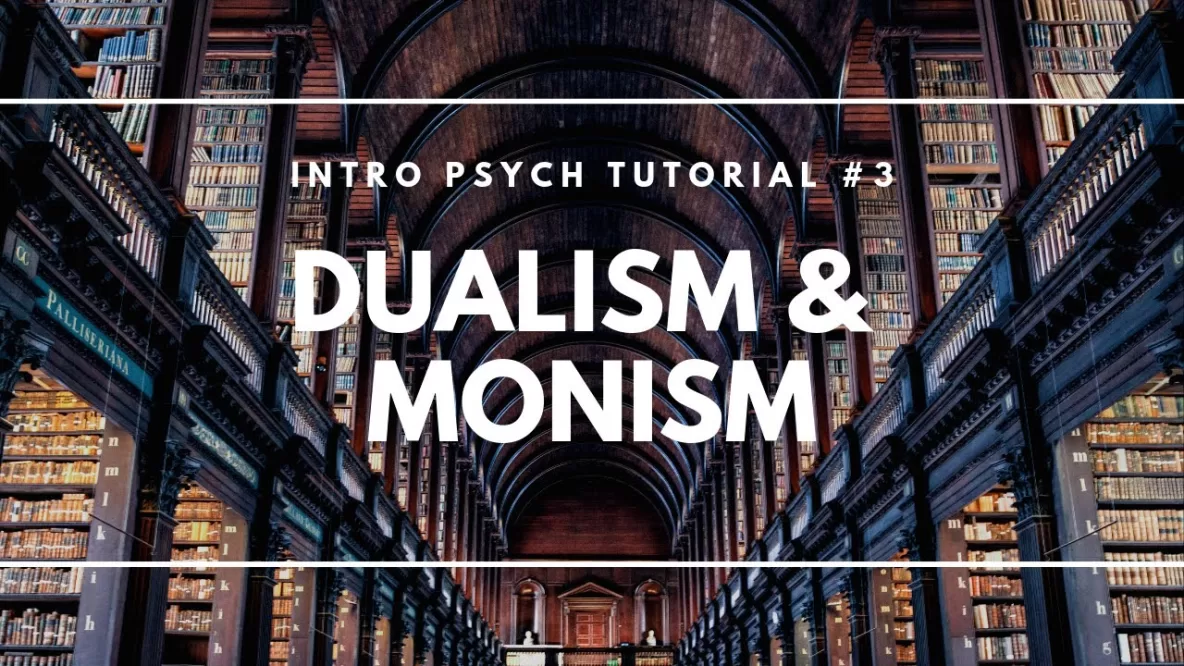In this video I discuss dualism, Descartes, monism, and Hermann von Helmholtz to consider why we can’t trust our intuitions about the world.
Don’t forget to subscribe to the channel to see future videos! Have questions or topics you’d like to see covered in a future video? Let me know by commenting or sending me an email!
Viewers in China can find this video here: http://v.youku.com/v_show/id_XMTgzNjk5MTMwOA
Video transcript:
Hi, I’m Michael Corayer and this is Psych Exam Review, where I answer common questions and explain the key concepts in psychology.
In this video we’re going to look at dualism and we’re going to start with Rene Descartes, who lived from 1596 to 1650 and here you can see a picture of Descartes, see he’s got a great soul patch going on there. Descartes believed in dualism and dualism is the idea that we have a mind or soul and the body that these are two separate entities. The body operates mechanistically and has reflexes and the mind is nonmaterial and separate from the physical world and it controls the body.
Now this idea of dualism might feel right but it’s actually wrong and most people today believe in monism. Monism is the idea, from the Greek mono for one, that there’s only one source. All of your thoughts your behaviors your emotions your traits, these all come from one source and that is physical processes of your body.
In other words all of mental life all of mental experience is actually physiology, everything has a physical underlying process. So if Descartes was wrong about dualism and if most psychologists today believe in monism, why am I still talking about Descartes? Well there’s two reasons the first is that it’s true the mind feels separate. Our thoughts seem to be somehow different from other physical sensations and so we can see why this idea was appealing to Descartes and why he believed it.
And the second idea is that Descartes was a genius. He was probably one of the most brilliant people who has ever lived and yet he got this wrong. What that tells us, the lesson we can learn from Descartes’ error here is that well we can’t trust our intuitions. No matter how separate our mind feels that doesn’t mean that it is separate. We have to separate our intuitions about how the world works or how our mind works from what we can actually measure and observe and this is gonna be true for many other topics we cover. We’ll see how illusions can fool our senses or how cognitive biases can distort our thinking and our decision-making.
I’d like to move now to talk about a man who lived about 200 years after Descartes. This is Hermann von Helmholtz and Helmholtz was a German physician. We’ve got a picture of him, here’s Hermann von Helmholtz and he was interested in reaction time and so he did some studies where he discovered that people responding to a stimulus touching their thigh they were able to respond slightly faster than for that same stimulus touching their toe.
Now what does this mean? Well the reason for this is the message from the toe has to travel all this additional distance up the leg and then up the spinal cord into the brain, so of course the message from the thigh has a shorter distance to travel than the message from the toes so it gets there a little bit faster.
Now what does this have to do with monism? Well it shows us that again it doesn’t feel this way. We don’t feel like there’s a time lag between something touching our toe or arm or thigh or anywhere. We think that mental life occurs instantaneously that our mind just knows things as soon as they happen but Helmholtz shows that that’s not the case. And that we can’t, again back to this idea, we can’t trust our intuitions about how things work. It feels instantaneous but when we sit down and actually measure it we find out that it isn’t.
Well that’s a basic overview of dualism and monism. If you found this video helpful please like the video and subscribe to the channel for more. Thanks for watching!

